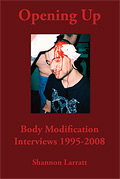I listened to an interview with Julie Devaney, who has written a book called My Leaky Body about her experiences as a chronic digestive disease patient in the healthcare system… It really brought back the frustrations that I’ve had as well, and the real difficulty that the medical system has dealing with chronic disease and diseases that aren’t visually super-obvious. Her condition seems to manifest with pain and diarrhea. Mine manifested initially with pain. I’m sure there was strength loss as well, but I started so much stronger than the average person that it took many years of degeneration for doctors to believe that there was any degeneration because even with years of muscle loss I was still much stronger than they were. That should have been a good thing but it wasn’t…
In the interview (the portions I heard — I had to take a break from it to pick up my monstrous weekly bag of twenty bottles of medication at the pharmacy) Julie talked about how patients are forced to “act sicker” and how hard this is. With most medical professionals, the squeaky wheel gets the grease. However, most people don’t like expressing pain in public. So when you go and talk to your doctor or specialist, you suck it up and act “professionally”. You speak clearly and calmly. You don’t downplay the pain, you tell them about it in detail, but you do it in a disconnected manner, both because it’s our nature to pull it together in public, and because disconnecting from the pain to talk about it is the only way to stop from breaking down into sobbing, which is not just embarrassing but makes it impossible to tell your story. Unfortunately doctors have this thing called “the unreliable patient”, a trained concept where they basically ignore the patient’s testimony as unreliable, and go by what they can observe about the person and their behavior instead. Problem is, with chronic conditions, the patient has to learn to cope. It’s not like a car accident where everything is a surprise and the response is going to be more carnal. So in chronic cases, all you can do is listen to their story and believe it.
“Believe” is really important too, especially in pain cases. Doctors are way too eager to write a person off as a con artist junkie pretending to be sick in order to get drugs. Because of this, probably millions of people are denied pain treatment because there are a small number of people getting pleasure without permission or so-called “need”. It’s completely messed up that the medical/political system feels that it’s better for a people to be in pain if treating their pain also comes with giving pleasure to a small number of junkies. The worst part is that true drug addicts are extremely good at acting sick. They really know how to play the doctors and play the system — far better than actual patients. So these “safeguards” do little toward their intended purpose, and just end up hurting people.
Another thing that Julie talked about, also related to the “unreliable patient” fallacy, is the problem with many chronic diseases, especially rare ones like my genetic condition (which is shared by only a handful of people), is that they are highly variable, difficult to observe externally, extremely difficult to diagnose, and usually not part of the typical medical curriculum. Thanks to a large degree to the Internet, patients have access to other people with the condition around the planet, are able to online read exotic studies in specialist medical journals that few doctors outside of that tiny field read… As a result, patients are often far, far more informed about the conditions that match their symptoms than their doctor. Unfortunately doctors, used to being (and enjoying being) the “expert”, are often deeply offended by informed patients. So much so that they discount any information. I used to think it was helpful to print out relevant articles and information for my doctors — for most of them, it just pisses them off. Perhaps they find it insulting. In any case, patients are forced to learn to be deferential, to figure out ways of tricking their doctor into thinking they solved the problem… Figuring out a way to get them to take the solution you’ve found and believe they found it. It’s messed up — and few people can manage all of this subterfuge, the “acting sick” demanded, while also coping with a debilitating and painful condition.
The part that really sucks is that once a doctor has committed themselves to treating you like a hypochondriac or drug seeker, they may get deeply upset and offended if and when proof finally arrives that you are sick — of course for many chronic conditions that proof never comes. Living in that uncertainty is hell, because part of you starts to believe the accusation that you are crazy. You start believing that maybe you are just a psychiatric case fooling yourself into thinking you’re in pain. I got “lucky” (in quotes because in some ways I’d rather be crazy) because after years of not being taken seriously — the only symptom besides my complaints was mildly elevated CK levels (indicating muscle injury; elevated CK levels can come from exercise for example) — they did a muscle biopsy on me, as well as a CT scan, and a test where they stuck needles in me and sent shocks through the muscle to check them out. The CT scan showed vague abnormalities in the muscles, with the degree directly related to the pain reported by me. The electrical test was similar — muscles weren’t working right. The biopsy came back with the vague diagnosis of “some unusual muscle structures”. And that’s it. So at that point they could see something was probably wrong, but they didn’t know what or why. Subsequent tests for various forms of muscular dystrophy and so on were negative. It wasn’t until I got a new doctor a year later with a bit more expertise that said “let’s take another look at that biopsy” and ordered it over to his hospital so he could take a look at it. The instant he saw it we had a hard diagnosis, because the “unusual structures” were so obvious and characteristic. Bizarrely, being told that I had an incurable and untreatable disease was one of the happiest moments I’d had in years — the doctor was shocked that I wasn’t traumatized instead.
So what happened when I brought this finally confirmed diagnosis to my primary doctors? They were angry. It forced them to see just how horrifically they’d treated me. How much pain they had caused by refusing me the pain treatment I needed. How much they had slowed down my diagnosis by ignoring me. One of them even terminated me as a patient for flimsy, fabricated reasons, and refused to even talk to me after being shown the diagnosis. Anyway… hearing the interview with Julie Devaney and listening to some of her stand-up show (she does a live version of her book) really reminded me how common this problem is in people with chronic and rare diseases… How many lives are made so much worse because doctors are not properly trained in how to deal with these conditions, and how to deal with patients… How out of date and out of touch many of the ideas in the medical community are.
I really want to recommend that if you have a friend or family member that is a doctor or otherwise works in the medical industry, My Leaky Body seems like it would be an excellent present that they would both enjoy and learn from. And of course it would be a great present for many people with chronic conditions — although there are many, myself included, who prefer to live their life with as little mention of illness as possible, so be careful. I know for me that my condition already affects and destroys so much of my life that I often feel very, very motivated to keep any mention of disease out of the parts of my life that I can keep pure… I hate being asked how I feel. I don’t like having to lie and say “fine”, nor do I want to tell the truth and say “fucking horrible, I hope I get hit by a bus”… I’d much rather just focus on the very tiny number of things that are still OK. Of course, here I am writing about it like a fool. So I will stop now as I’m not doing myself any favors. I’m rambling anyway. Sorry, not gonna proof read it either. If you want something proof-read (and funny), go for Julie’s book instead.








